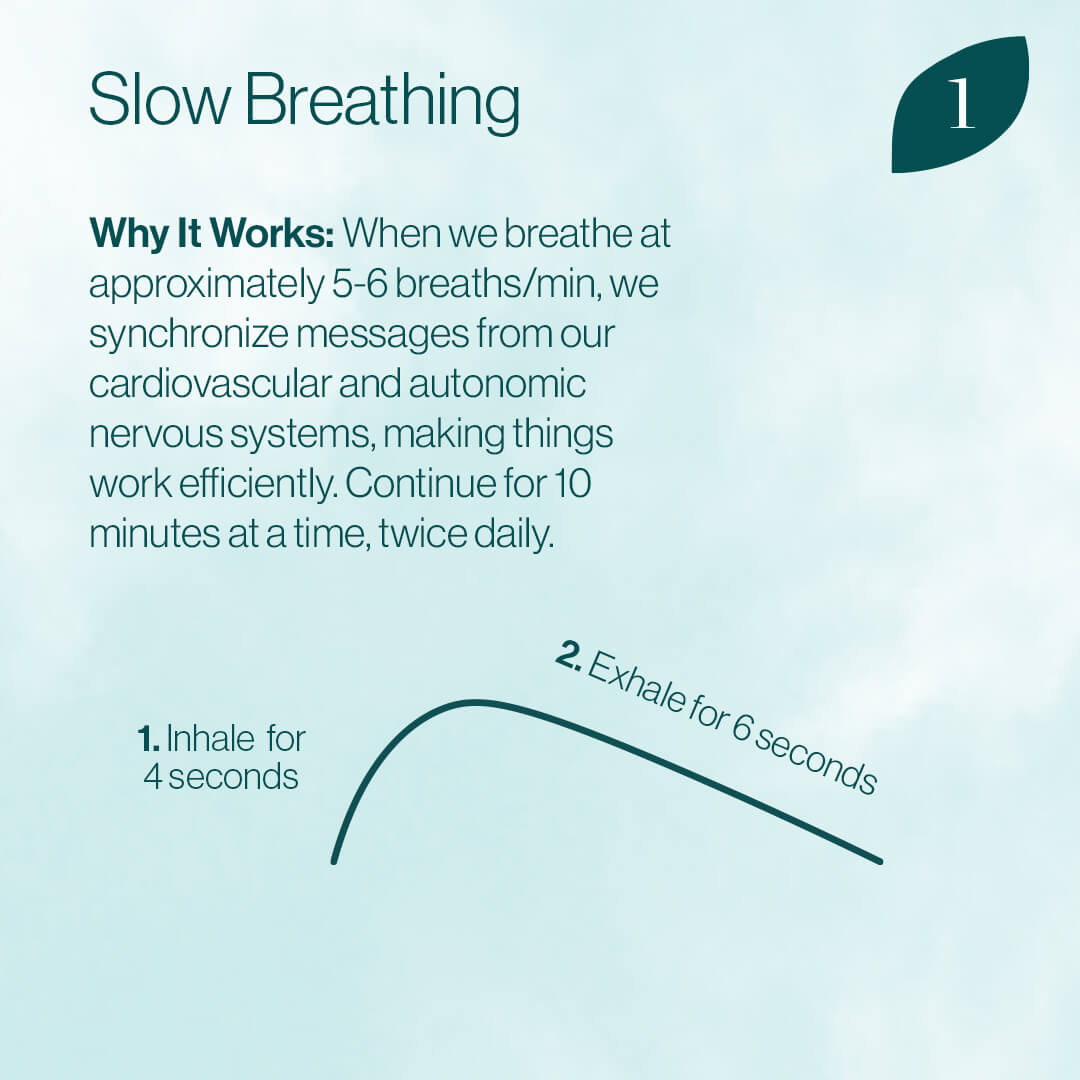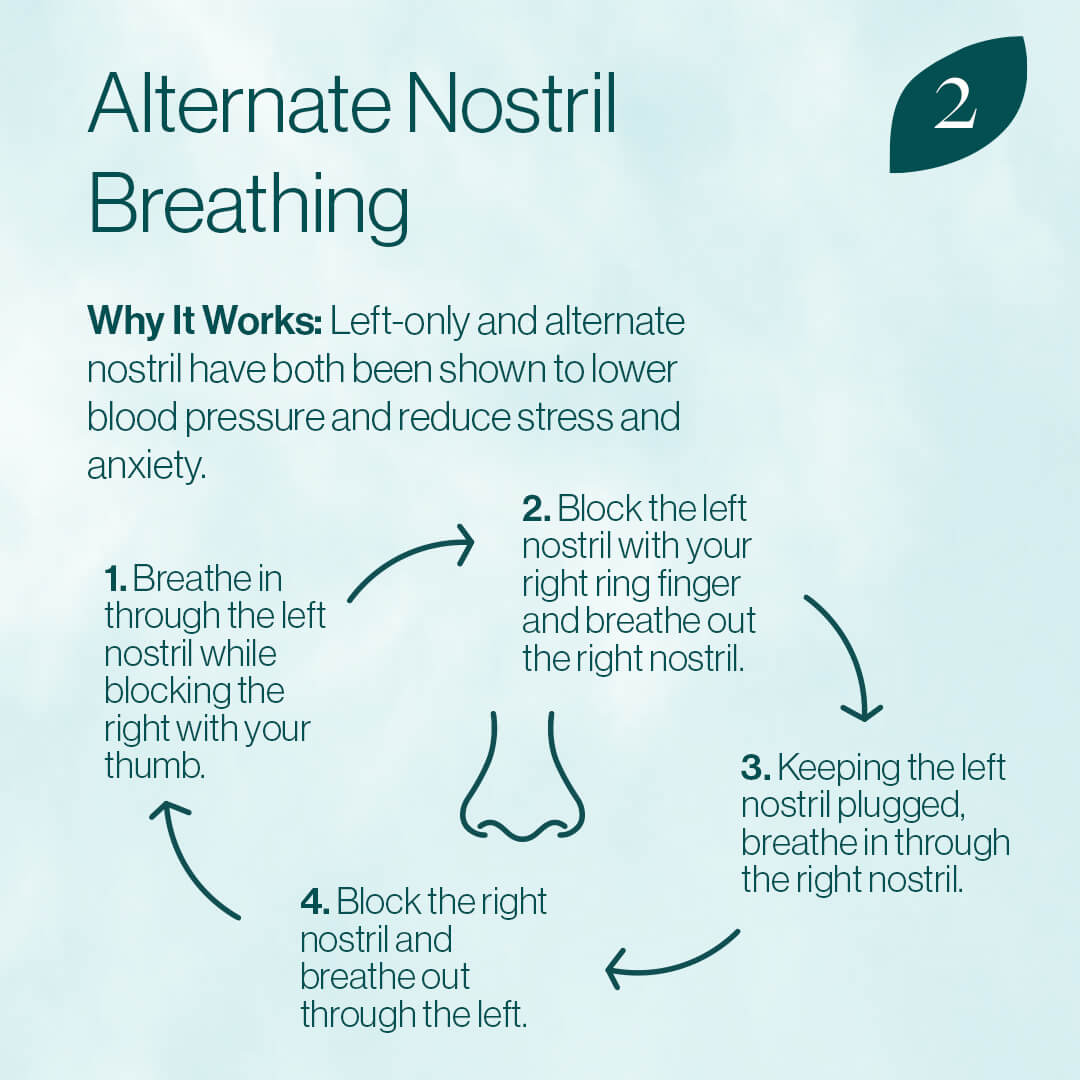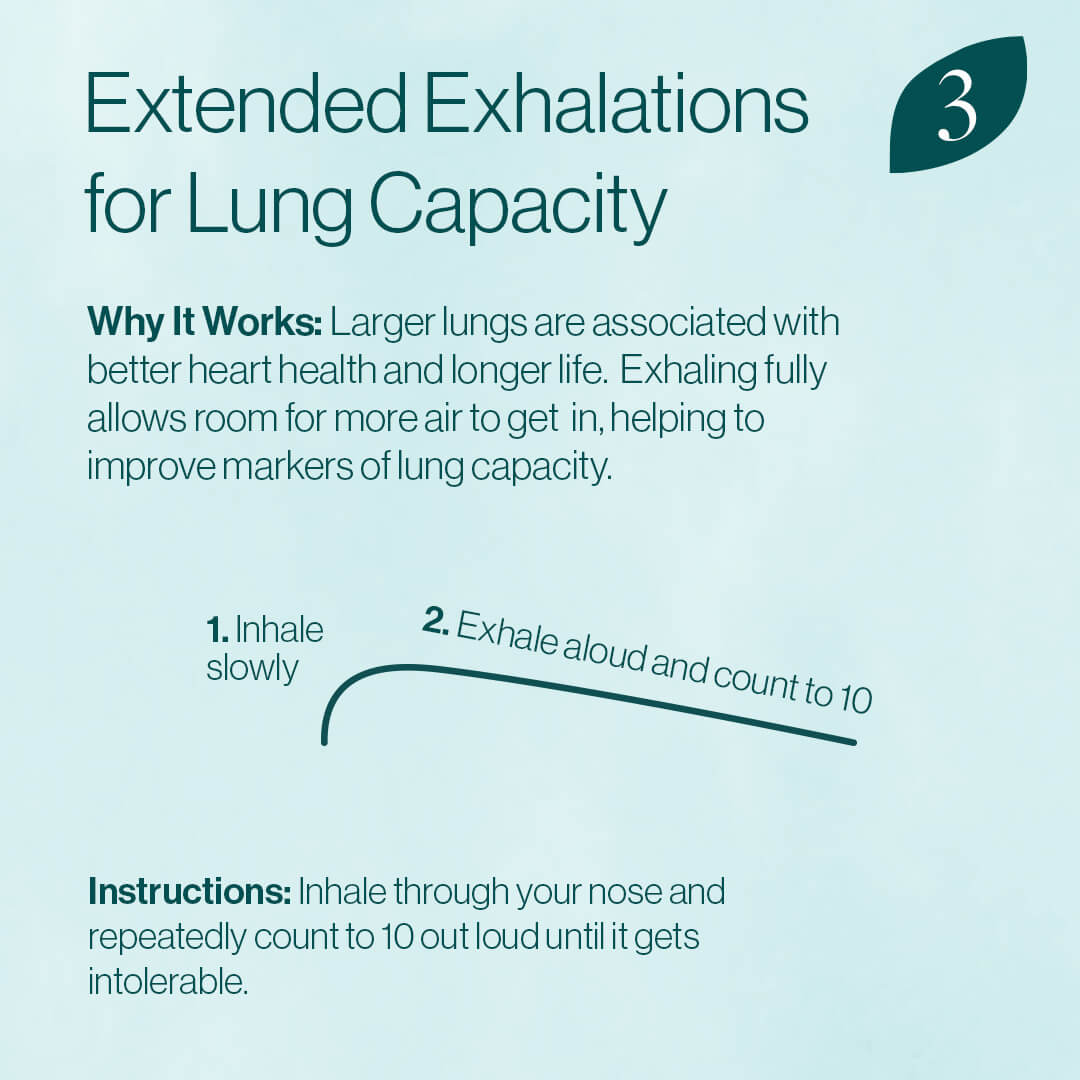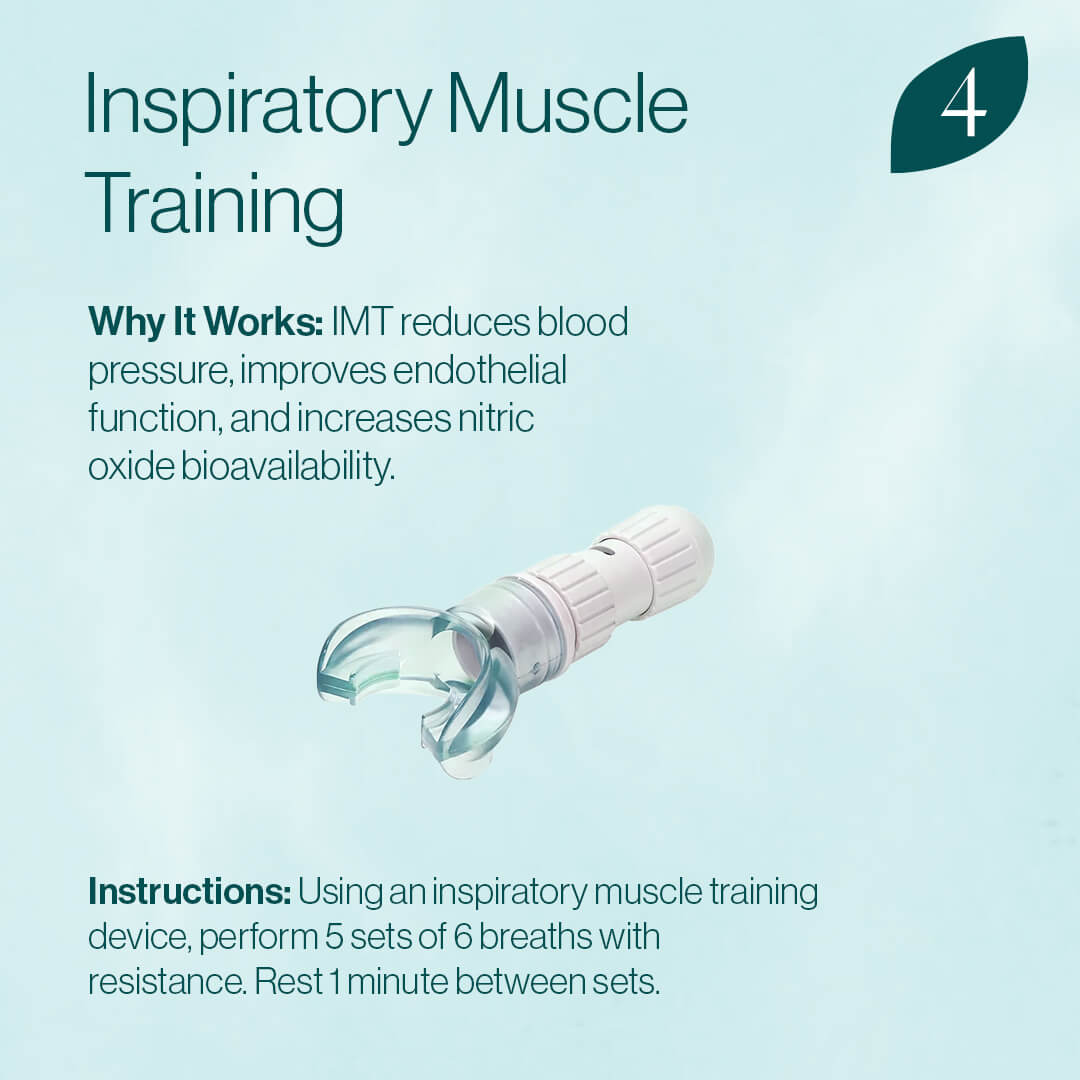Your heart and your breathing work in elegant harmony to improve health and life span:
- Inhalations cause the heart rate to increase, and exhalations cause it to decrease, which is called respiratory sinus arrhythmia (RSA).
- Breathing slowly at around six breaths per minute synchronizes your heart and nervous system, boosting heart rate variability (HRV).
- Greater lung capacity is associated with a lower risk of cardiovascular issues and longer life.
We can take advantage of this heart-breath connection to improve cardiovascular health and live a better life. We’ll share 4 breathing exercises to strengthen heart health and function below!
Why is Deep Breathing Good for Heart Strength?
Before getting into our top four breathing exercises to strengthen your heart, let’s examine the link between deep breathing and heart strength in the first place.
Deep breathing exercises strengthen the heart by directly impacting the autonomic nervous system, which controls your heart rate and other unconscious bodily functions. There are a few mechanisms of action that support the use of breathing exercises to strengthen your heart:
Enhancing Heart Rate Variability (HRV)
Deep breathing improves heart rate variability (HRV), which is the measure of the variation in time between heartbeats. Higher HRV is associated with better cardiovascular health, more resilience to stress, and a stronger heart.
Deep breathing helps increase HRV by promoting balance between the sympathetic (fight-or-flight) and the parasympathetic (rest-and-digest) branches of the autonomic nervous system. This balance affects cardiovascular efficiency and can help maintain a healthy heart rhythm.
Stimulating the Vagus Nerve
The vagus nerve helps control heart rate and blood pressure, and deep breathing stimulates this nerve. It activates the parasympathetic nervous system, which encourages relaxation and reduces stress.
This stimulation helps to lower the heart rate and blood pressure, reducing the heart's workload and enhancing overall heart health.
Improving Oxygenation and Reducing Workload on the Heart
The body increases its oxygen uptake through deeper breaths than short ones. Enhanced oxygenation means the heart doesn’t have to work as hard to deliver oxygen to tissues.
Using oxygen more efficiently not only supports better endurance but also reduces the strain on the heart, which can be particularly beneficial for maintaining heart strength over time.
Reducing Stress and Its Cardiovascular Impact
Chronic stress can lead to increased heart rate and blood pressure, slowly but surely putting a strain on the cardiovascular system.
You can counteract stress through deep breathing to promote a relaxation response in the body. Making this a regular ritual can decrease overall stress levels, in turn preventing the long-term adverse effects on heart health.
The Four Best Breathing Exercises to Strengthen Heart
So, what are the best breathing exercises to strengthen heart health and function? We’ll share our four favorites below to help you get started strengthening your ticker today!
1. Slow Breathing at 5-6 Breaths per Minute

BONUS: Anecdotally, many people feel greater benefits if they imagine breathing into their hearts for this practice. As you breathe in, imagine the breath going into the heart. As you breathe out, imagine the breath leaving the heart. It’s a relaxing and joyful way to perform slow breathing.
2. Left-Nostril and/or Alternate Nostril Breathing
Like slow breathing, research consistently shows that left-nostril and alternate-nostril breathing improve heart health. For example, both have been shown to lower blood pressure and reduce stress and anxiety.
Breathing with only the right nostril is more stimulating, with some evidence suggesting it activates the sympathetic (fight-or-flight) nervous system. So, for heart health, we want to stick with either left-nostril or alternate nostril breathing.
How to do it:
For left-nostril breathing, use your right thumb to block your right nostril. Don’t plug your nostril; instead, press very gently on the soft cartilage of the nose to keep it closed. You can breathe at a comfortable pace or combine this method with slow breathing (see above).
For alternate nostril breathing, start with your right thumb closing your right nostril. Inhale through your left nostril, then block the left nostril with your right ring finger and exhale through your right. Next, inhale through your right nostril, block your right nostril, and exhale through your left.

For timing, you can use the same protocol described above for slow breathing. But you should stop if your arm gets tired, as the stress of trying to hold it up will offset the positive effects of the breathing technique.
3. Extended Exhalations: A Counterintuitive Lung-Expanding Breathing Exercise
Larger lungs are associated with better heart health and longer life. Although genetics plays a role here, we can take steps to increase our lung capacity. And, somewhat counterintuitively, it starts with our exhale.
In the 1940s, Carl Stough, an American choral conductor turned breathing specialist, discovered that the key to bigger lungs lies in the out-breath. James Nestor nicely explains Stough’s work in Breath: “[t]he key to breathing, lung expansion, and the long life that came with it was on the other end of respiration. It was the transformative power of a full exhalation.”
To get more breath in, we must get all the stale air out.
How to do it:
Stough developed an extensive program for improving lung capacity, but a simple starting exercise is to take a breath in through your nose and repeatedly count to 10 out loud.

You’ll start clear, then move to a whisper, before you eventually you’re just moving your mouth. When it gets uncomfortable, you’ll know all the stale air is out, and you can take a full breath in (through your nose, of course).
4. Inspiratory Muscle Training: A Fast (but Pricey) Path to Better Heart Health
Recent research has shown that training our breathing muscles improves our hearts. It’s like getting physical exercise without leaving your chair.
For example, it was discovered that breathing using a resistance device (called inspiratory muscle training) for about 5 minutes per day could:
- Significantly reduce blood pressure
- Improve endothelial function
- Reduce oxidative stress
- Increase nitric oxide bioavailability
- Reduce systemic imbalance
That’s pretty incredible for just a few minutes a day.
How to do it:
Inspiratory muscle training requires using a breathing resistance device. Many options are available, ranging from approximately $50 to $500+. The one used in the study mentioned above was in the higher range, coming in at $499.
Once you have a device, here is the procedure used in the study:
The participants performed five sets of 6 breaths at 75% of peak inspiratory pressure, with 1-minute rest between each set of 6. This comes out to 30 breaths total over about 5-7 minutes. They did this six days a week for six weeks.

While it is an excellent starting protocol, this is still a new area of research, and there is no decisive “best approach” yet.
So, my advice is to do the best you can with whichever device you decide on. (For example, I perform this 30-breath protocol with a resistance device, but I don’t know my exact 75% peak pressure. So, I simply set the resistance to be challenging but manageable.)
More Tips on Supporting a Strong, Healthy Heart Beyond Breathing Exercises
You can use these four excellent breathing practices to boost your heart health. Of course, the most important thing is to get started and stay committed and consistent.
Additional Advice on Improving Heart Health
With resB® and our top heart breathing exercises you are well on your way to strengthening your heart and living a healthier, happier life. Here are a few more tips to consider:
- Maintain Regular Physical Activity: Engaging in moderate exercise for at least 150 minutes per week can significantly enhance heart health by improving blood circulation and heart function.
- Adopt a Heart-Healthy Diet: Focus on consuming a diet rich in fruits, vegetables, whole grains, and lean proteins. Reduce intake of saturated fats, sodium, and added sugars to support overall cardiovascular health.
- Monitor and Manage Stress Levels: Chronic stress can negatively affect heart health. Practices such as mindfulness, yoga, or even simple daily relaxation techniques can help manage stress effectively.
- Ensure Adequate Sleep: Aim for 7-9 hours of quality sleep per night. Sleep helps regulate stress hormones and helps maintain your immune system.
- Stay Hydrated: Drinking adequate water is essential for maintaining the elasticity of blood vessels and proper cardiovascular function.
- Regular Health Screenings: Regular check-ups and screenings for blood pressure, cholesterol, and other heart-related metrics can catch potential problems early and help maintain heart health.
Final Thoughts on Our Favorite Breathing Exercises for Heart Health
As you can see, there is a clear link between deep breathing and heart health. You can take a few moments each day to add these breathing exercises for heart health to protect the most important organ in your body.
Our blog has more resources to help you live a more holistic, healthy lifestyle including the vasaka leaf benefits, probiotics for lung health, breathing exercises to increase lung capacity, why we should breathe through nose not mouth, gut health detox, herbs for lung health, and more.
---
Whether you need a prebiotic or probiotic supplement or both we’ve got clinically studied solutions waiting to be discovered.
These are expert opinions on lifestyle from professionals who are board-certified physicians, registered dietitians, or healthcare professionals. This content does not represent any medical advice for the prevention or treatment of any medical diseases.